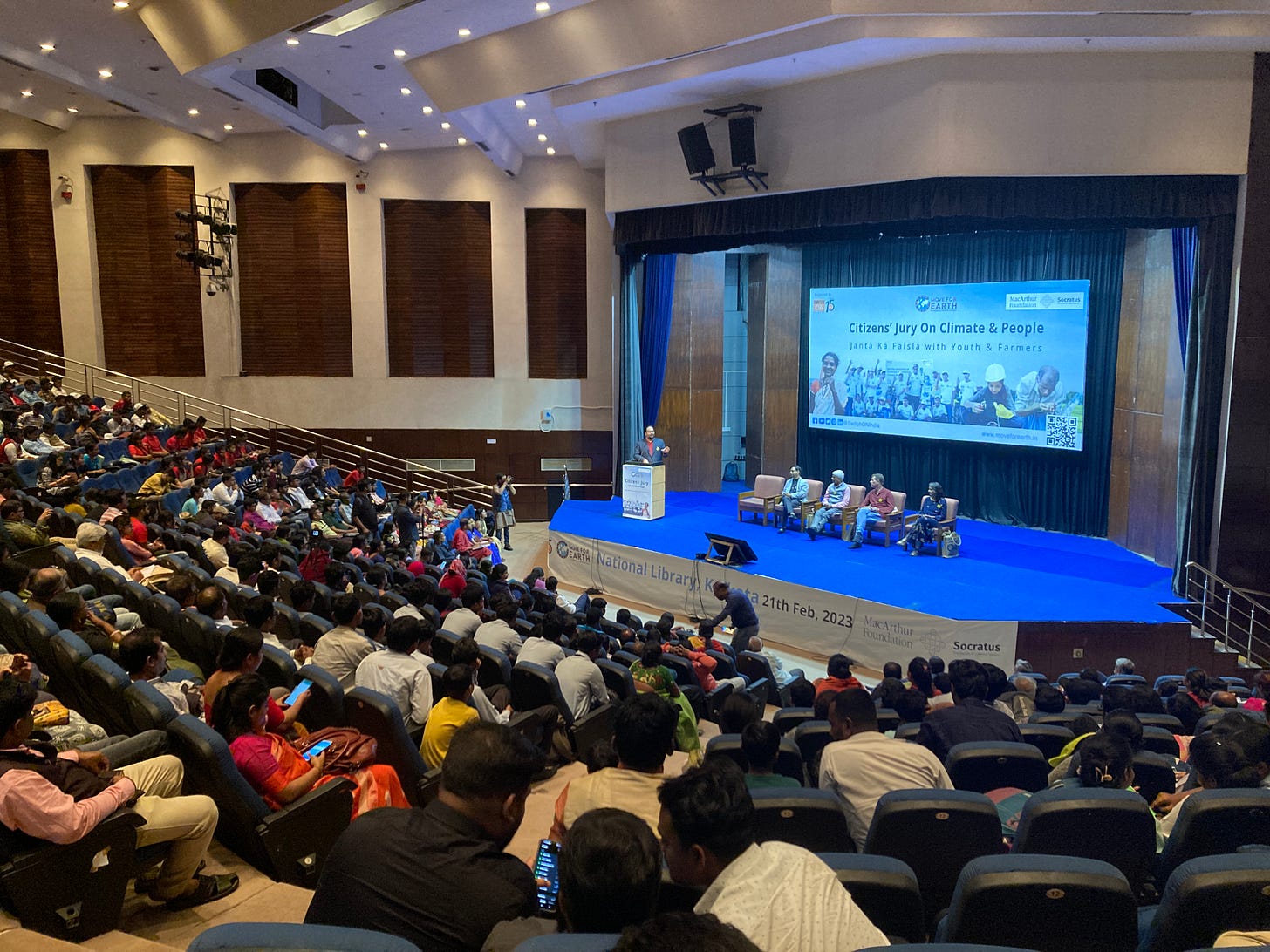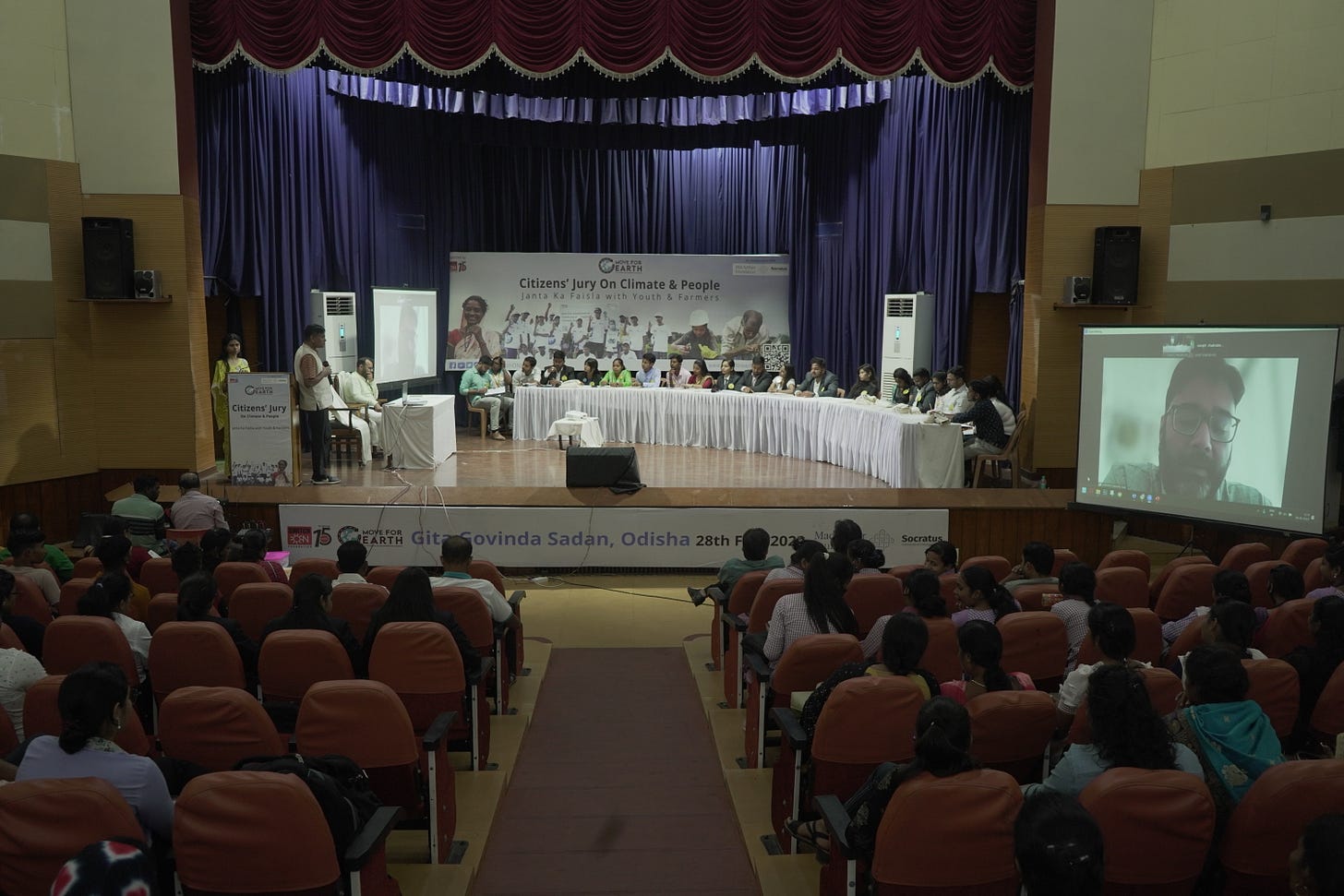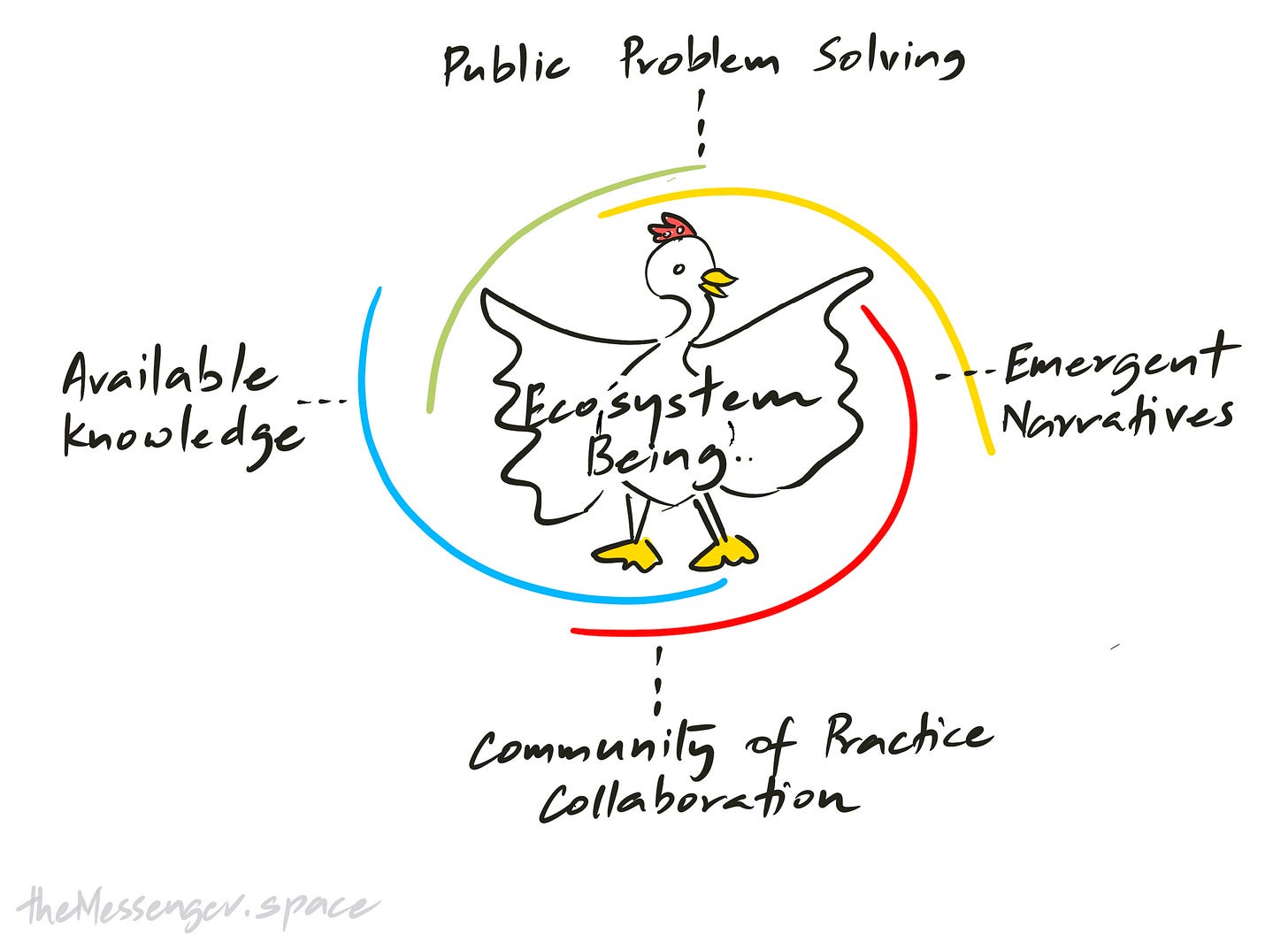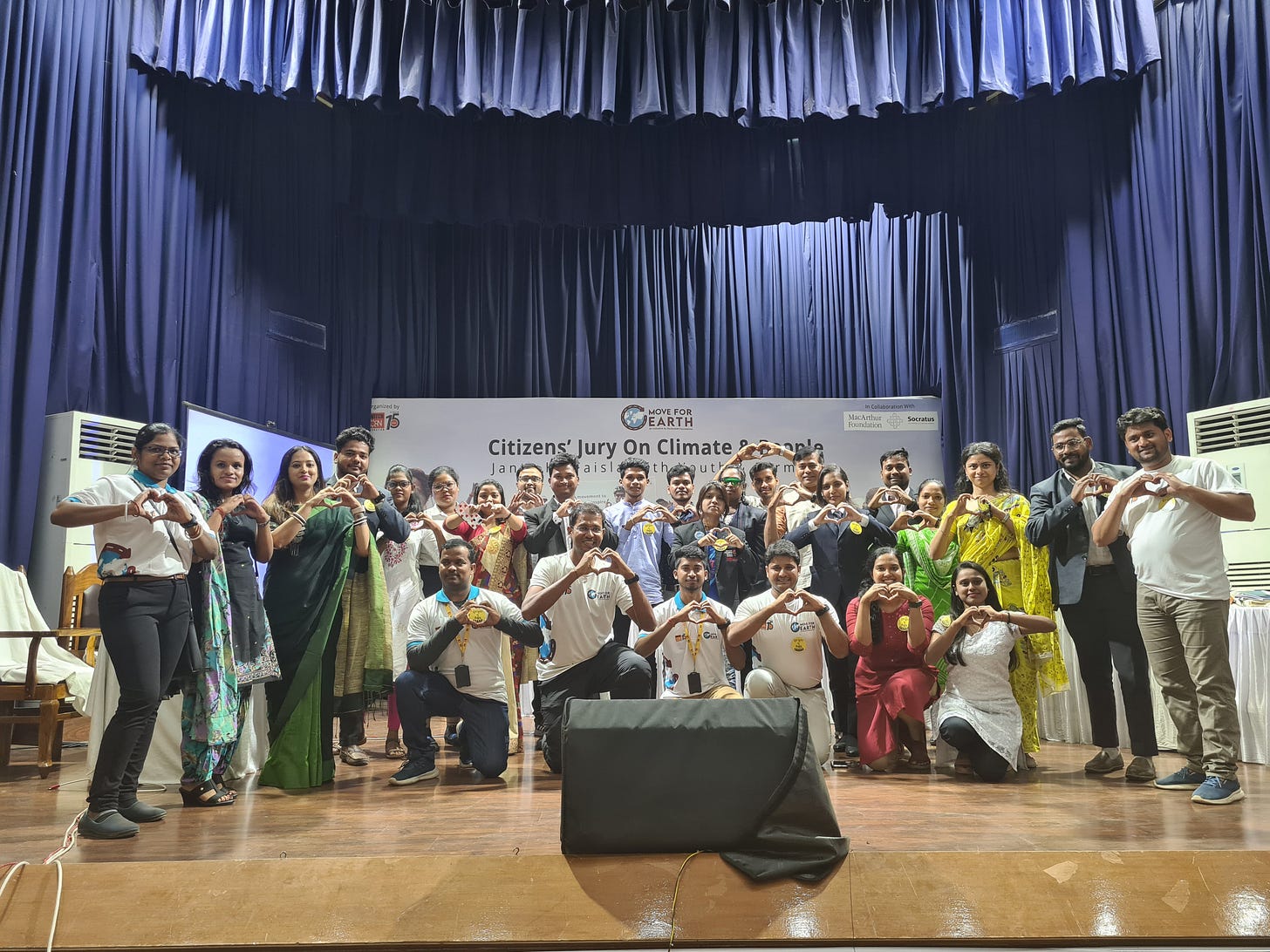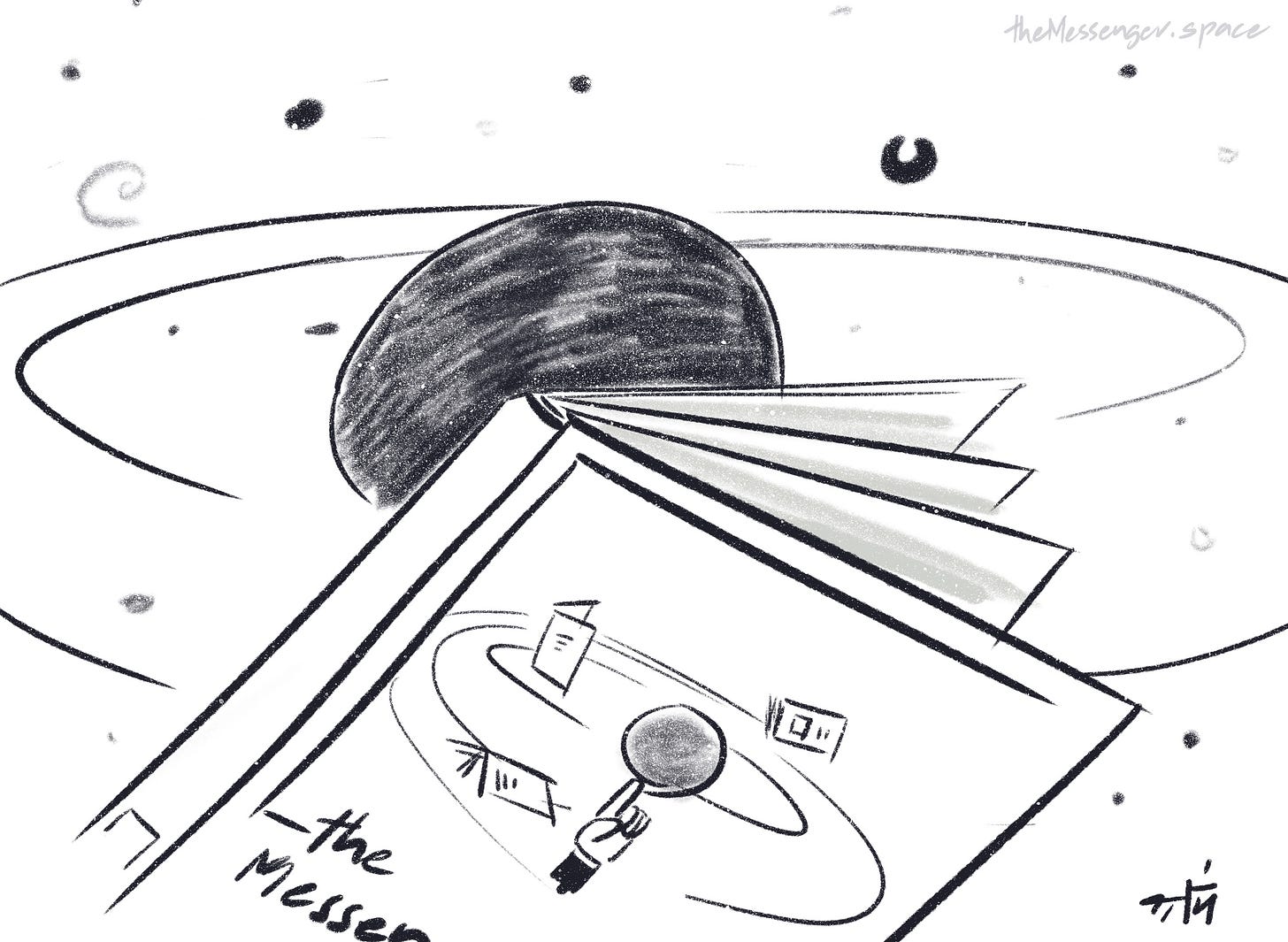Ecosystems of citizenship
This week’s Messenger is based on an ongoing collaboration with the SwitchON Foundation. We thank them for the opportunity to co-create citizen spaces. Socratus’ work was led by Devjit Mittra, Smriti Tiwari, Nithin Vemula and Nitya Jadeja.
Stage & Space
We aspire to live in well appointed, security enabled houses, apartments and neighbourhoods where we can shield our families and loved ones from the vagaries of the world. It’s a model of retreat, not engagement which doesn’t work in times of strife, when public participation and community good will are essential in the face of catastrophe or disaster.
We think we can isolate ourselves from the problems of the world and the authorities (which authorities though?) will address our challenges, but how can one institution, however powerful, wipe every tear? We believe that collaborating with our fellow citizens as peers is an alternate - and scalable - method for public problem solving.
Enter citizenship and the claiming of one’s space in society.
Field Notes: SwitchON Ecowisdom
When we break out of our bubbles of exclusivity, we open ourselves up to new possibilities and experiences. By extending our arms with an open mind, we witness the power of collaboration firsthand. Through our recent partnership with the SwitchON Foundation, we explored a diverse range of topics across multiple geographies. In the process, we saw that the roots of the citizens' jury format are extending wider and deeper, reaching further than ever before.

The partnership
SwitchOn and the Socratus Foundation came together to host 4 citizens' juries across 3 locations and two demographics: farmers and youth. SwitchON used its network on the ground to identify venues and the jury for the three events. Socratus served as a knowledge partner, providing framing, moderation, deliberation and documentation for jury proceedings and the verdict.
The Issues
We started with two parallel juries in Kolkata. A Youth Jury explored Waste Management and Green Entrepreneurship, while a Farmers' Jury discussed Sustainable Agriculture and Distributed Renewable Energy (RE) focusing on solar pumps for irrigation. A few weeks later, in Odisha, the Youth Jury delved into the Future of Electric Vehicles, Air Pollution and Health. A Farmers' Jury on Odisha explored the potential for Distributed Renewable Energy systems in irrigation as well as Sustainable Agriculture with a focus on millets.
In all of these events, jury members were guided by a team of two to four experts, each possessing specialized knowledge in at least one of the topics being deliberated by the group. This diverse panel of experts brought a wealth of experience and insight to the table, ensuring that the discussions were informed, nuanced, and thought-provoking.
The Venues
The importance of civic spaces in our pursuit of inclusive flourishing futures cannot be overstated. All three venues had spaces appropriate for large gatherings and facilitating deep deliberation. Collectively, they were an (imperfect) cross-section of non-commercial civic spaces in Indian cities.
Located on the historic Belvedere Estate, the National Library of India in Kolkata is a majestic sight and one of the most suitable venues for surfacing collective wisdom. Visitors are welcomed by a tall bronze statue of Tagore looking into the distance. Bhasha Bhawan (the venue) can be seen behind the statue - an assortment of cuboids plopped on a high plinth. Two sets of stairs rise from the ground as they wrap around the volume. Petunia blossoms of different colours line the way. Occasional bougainvilleas perched on the plinth add a pleasant contrast.
Bhasha Bhawan's large auditorium and conference room hosted the two juries. The 200+ capacity auditorium has a large stage and it comes equipped with state-of-the-art audiovisual systems. The conference room, on the other hand, had a more formal set-up with tables arranged in a U-shape.
The Odisha juries were held in two locations - Bhubaneswar and Balangir. The Jaydev Bhawan in Bhubaneswar, situated near the Central Secretariat, boasts a midcentury architectural style with beige and terracotta-coloured exteriors. With its reclining chairs, stage and shallow balcony, the auditorium exudes vintage charm. Despite the last-minute venue change, our team made the necessary arrangements and accommodated everyone in a semi-circular arrangement, with the Friends of the Jury (FoJ) dividing the groups.
In Balangir, the jury was held at the town hall, a simple building with a dais and fixed plastic chairs reminiscent of old-school movie theatres and auditoriums. Although it has been used extensively by the local population for events, shows, and weddings, it was not as well-maintained as it could have been. The chairs had been numbered with markers, and there was a notice asking attendees to sit according to their seat numbers, presumably for a ticketed event held previously. Doorways that were not in use had been blocked off in a makeshift manner with wooden planks and bamboo poles.
Overall, the nostalgic charm of our venues inspired a longing for an imagined past glory - from the flourishing that was to the flourishing that can be. Simultaneously, their worn infrastructure, caused by a combination of neglect and loss of patronage, added to the necessary gravitas for the discussions.
Our Process
Some of our previous juries were conducted over 3-4 days. This time around, we implemented a more efficient format . The SwitchON team led the expert and jury selection and provided on-ground logistical support, while the Socratus team curated resources to bring the youth jurors up to speed on relevant topics. Both teams co-designed the agenda, and we moderated the proceedings and deliberations.
The expert witnesses were given ten minutes to present their perspectives, followed by a ten-minute question-and-answer session. The jury then spent ten-minutes reflecting on what they heard. They worked in groups to answer three key questions related to each session's theme, aiming to reach a consensus on potential solutions and consider the role of civil society, governments, and citizens in the future. During the deliberations, the ‘Friends of the Jury’ played a crucial role in facilitating smaller post-expert and question-answer sessions and helped finalize the verdict.
Key Learnings
It’s hard to distill intense activity over several weeks into a few paragraphs, but here are five takeaways:
Key themes: The juries emphasized the importance of a just transition, especially in empowering historically marginalized communities and promoting gender equality. Capacity building, specifically through vocational training in green entrepreneurship, was identified as crucial. The concept of circular economy emerged as a key topic, while the Farmers' Jury highlighted the urgent need for insurance due to the unpredictability of climatic patterns.
Shorter format: We realized that the facilitation style and session design had a more significant impact on empowering citizens to make the best use of our platform than the event's duration. We will continue to pursue shorter juries.
Spatial Design: The physical space had an impact on the jury proceedings and it was found that small rooms with invested audience members were more conducive to deeper engagement. The expert witnesses, when placed on stage, felt the need to address the audience in addition to the jury (they were asked to address the jury alone) which created distractions.
Jury selection: The SwitchOn team was highly effective - they selected a diverse jury members who followed the guidelines for the events, resulting in well-informed, open-minded and articulate jurors.
Role of the audience: The people in the audience also wanted to contribute to the discussion but unstructured interventions can be disruptive. We have to think of creative ways to involve them in the proceedings to enrich the discussion.
Conclusion
While communities bear the brunt of climate change, their voice on this issue is muted as climate change is an underlying cause while the events and impacts are disparate and distributed. The urgency of the climate crisis will come through if we make leaders and communities ‘feel’ the impacts through immersive experiences such as a Citizens’ Jury. Our collaboration with SwitchON gave us hope for the future, but with hope comes responsibility. Much remains to be done on the design of citizen spaces- for example, juries can be enhanced using technologies and platforms that make climate challenges transparent, immersive and, the deliberations scalable across geographies. We will continue to report our progress on these design challenges in the Messenger.
Ultimately, we want imaginations of a flourishing life and genuine citizenship informed by expert knowledge from communities across India. With that thought, we leave you with an image highlighting how public problem-solving may look like in action. It is youth-led, cuts across societal divisions and is full of collaboration and compassion 🫶🏼.









